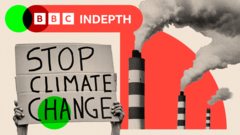Amidst doubts regarding the efficacy of COP29, the possible withdrawal of the U.S. under Trump opens the door for China to play a leading role, indicating a potential shift in the dynamics of international climate policy.
COP29: A Shift in Climate Leadership as China Takes the Spotlight

COP29: A Shift in Climate Leadership as China Takes the Spotlight
As the U.S. steps back from COP negotiations, China emerges as a more proactive player in global climate talks.
As COP29 unfolds, the stark reality of U.S. withdrawal looms large, weighing heavily on the discussions. An insider message from a prominent chief negotiator at the event paints a grim picture—a consensus that this may be the least effective COP yet, as negotiations have expanded rather than narrowed, reflecting a deepening divide among factions. The anticipated reelection of Donald Trump, who regards climate action as deceptive and aims to boost U.S. fossil fuel production, casts a shadow over the deliberations.
However, amid this landscape, a surprising twist has emerged: China’s shift towards a more cooperative and proactive stance in negotiations has ignited interest among global representatives. Traditionally a complex yet often obstructive player, China is showing signs of stepping up its role, potentially filling the void left by the U.S.
Notably, this year marks China's unprecedented openness regarding climate funding. It disclosed that since 2016, it has allocated over $24 billion to developing countries for climate initiatives—a figure that emphasizes its commitment and contrasts sharply with the lack of transparency previously displayed. This newly adopted approach indicates a willingness to take the lead in climate financing, which is critical as developing countries seek significant investments to transition towards cleaner energy sources.
The dichotomy of China’s status as a developing nation, despite being the world’s second-largest economy, complicates its involvement in the negotiations. Unlike its developed counterparts, it is not mandated to contribute to the climate financing fund agreed upon by wealthier nations. Yet, an economic shift has spurred Chinese interests in promoting renewable technologies, with a significant portion of the global supply chain rooted in its manufacturing base.
Professor Michael Jacobs from Sheffield University highlights the significance of the language employed by Chinese officials, which resonates with that of developed nations—indicating a potential claim for leadership in this domain. This evolution in rhetoric promises a new landscape as negotiations pivot with China taking the helm.
Predictions suggest that if China emerges as a leader, it will not do so overtly but rather, through calculated, behind-the-scenes maneuvers. Historical patterns reveal a general reluctance on China’s part to confront disputes directly, which may change as it seeks to steer the COP process towards greater agreement.
Nevertheless, challenges remain. China’s relationships with fossil fuel-producing nations, including its historical support for Saudi Arabia’s interests, may hinder its capacity to advocate fully for renewables. As discussions progress at COP29, observers remain cautiously optimistic, believing that the burgeoning economics of renewable energy could dictate the next era of climate negotiations.
In summary, as the U.S. potentially retreats from COP cover, China’s recent assertiveness hints at a tectonic shift in international climate discussions—a transformation built on economic opportunity and necessity, rather than mere political strategy. This new dynamic underscores the evolving landscape of climate governance, wherein the focus on innovation, investment, and technology takes precedence over traditional power plays and positions.





















